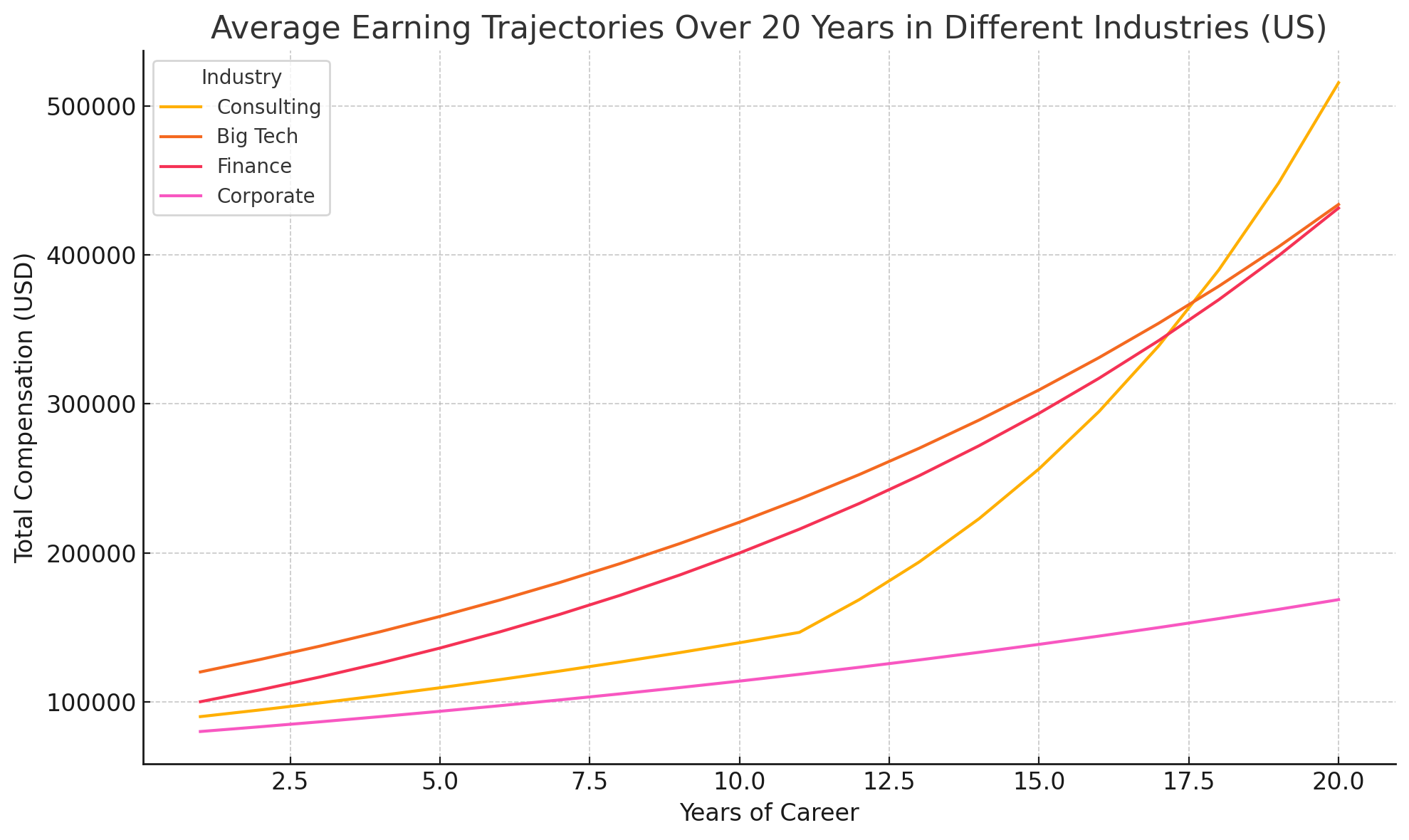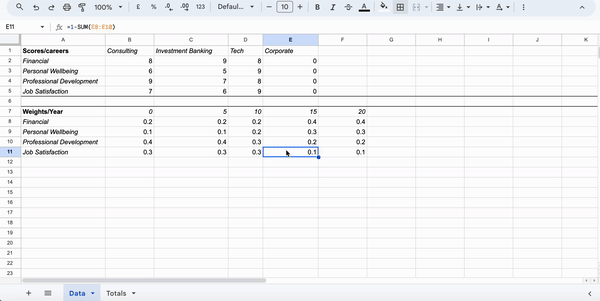This article will help you critically assess whether consulting is truly the right fit for you. We’ll guide you in estimating the utility of careers across different sectors by providing a scoring system to quantify your priorities, along with real-life examples to illustrate the decision-making process. In theory I should try to sell you the dream so you work with us and purchase some package but I won't do it (just for today). By the way, if you prefer the video version, please find below.
Approach
To decide if consulting is the career path for you, we’ll estimate the total utility of working in consulting compared to other similar options.
We’ll use a weighted matrix approach to break down each career choice into distinct parameters. Here’s how it works:
Assign a Score: You’ll rate each parameter on a scale from 0 to 10, assessing how favourable it is. This should be based on analysis, helping ensure you’re consistent in your evaluations.
Assign a Weight: Each parameter will also get a weight that reflects its importance to you personally. Unlike scores, these weights are subjective and will vary based on your individual priorities and values.
We’ll focus on key parameters like:
- Financial: What kind of salary and benefits can you expect?
- Personal Wellbeing: How does this job impact your work-life balance and overall happiness?
- Professional Development: Are there clear paths for growth and learning?
- Job Satisfaction: Will you enjoy what you do day-to-day?
We’ll provide some guidelines on how to assign scores and weights over time for several sectors; however, you are the only one who can do it! To make this process easier, we’ve put together a Google Sheet (you will need to email us to get access) that you can duplicate and play around with. Feel free to change timeframe, sectors and other variables so that it fits your specific needs.
Caution! Not IKIGAI
It’s important to call out how many HR managers and life coaches have taken the concept of Ikigai and turned it into a simplistic Venn diagram to sell a quick way to find purpose in your career. This westernized version misses the true depth of the original Japanese concept and feels like cultural appropriation. It reduces something rich and meaningful into a catchy but shallow formula. While Ikigai is about finding deeper meaning in life, finding meaning in your career can be more straightforwardly quantified using a utility function, which we formalize in this article. For more insights on this topic, check out this resource.

Macro trends
Someone once told Walt Disney that most people would find a cartoon mouse repelling. Making predictions is always hard but trying to get a feel for what the future holds can be helpful.
To predict where the consulting industry is heading, it’s important to understand why firms hire consultants and how these firms generate revenue:
Reasons for Hiring Consultants:
- Top Talent on Demand: Companies seek hard-to-find expertise.
- High Functional Expertise: Consultants provide specialized skills (e.g., HR, customer support) that may be missing in-house.
- Networks and Best Practices: Consulting firms offer access to extensive networks and proven methodologies.
- Fresh Perspectives: They bring new insights to complex problems.
- Political Support: C-level executives often need external validation for difficult decisions.
Consulting firms primarily operate on a billable hours model, resulting in low operational costs compared to their revenue potential. Several macro trends could impact the growth of consulting firms:
Scalability Issues: the traditional consulting model is not inherently scalable; while efficiency can improve through tools, it cannot scale like tech giants (e.g., Google).
Information Democratization: greater access to information allows companies to obtain insights independently, reducing reliance on consultants.
Proliferation of B2B SaaS Solutions: tools like Atlassian and Notion address many functional challenges, diminishing the need for consulting services.
Easier Access to Data: more readily available data means consultancies don’t need to conduct as many analyses as before.
Changing Needs of New Companies: new companies often operate with innovative approaches and may not require traditional consulting support.
Revenue Insights
Examining McKinsey's financial performance reveals a concerning trend for the company:
- Revenue per Employee: Dropped from $432,000 in 2014 to $355,000 today, somewhat linearly
- Real-Term Revenue Decline: The 2014 figure, adjusted for inflation, equates to approximately $575,370 today, indicating a nearly 50% decrease in real terms.
These factors indicate that the consulting industry may be grappling with significant challenges as it adapts to a rapidly evolving business landscape. A notable concern arising from these trends is the potential decline in the firm's reputation. The decrease in revenue per employee suggests that average rates are declining, or that a larger number of consultants are now required to deliver the same level of work. This shift points to a possible lowering of project complexity, moving from high-level strategic initiatives to more implementation-focused tasks. Now, these are just hypotheses, no one can predict the future (a much deeper analysis would be needed anyways to understand where the decline comes from etc.) but it's simply to show you that the past may not be an accurate predictor of the future.
Scores
In this section, we provide guidance on the rationale for scoring each factor. You are encouraged to tailor the scoring to reflect your specific circumstances and role.
Financial
When assessing the financial parameters of a career in consulting, it’s important to note that consulting salaries are highly competitive globally. Entry-level consultants can expect salaries ranging from $70,000 to $100,000, with mid-career professionals earning between $120,000 and $200,000. At the partner level, this can soar to $300,000 or more, significantly outpacing average salaries across most industries. The chart below shows the average salaries across some sectors.

Consulting compensation primarily consists of cash and bonuses, which tend to be less volatile than stock options and generally have a smaller bonus component compared to finance roles. Additionally, consulting offers excellent perks, allowing professionals to enjoy a luxurious lifestyle without excessive spending—something not guaranteed in finance or entrepreneurship.
However, the past cannot predict the future! Career progression and partner compensation in the next 20 years may not reflect the trend observed in the previous 20 years.
Given these factors, consulting may yield a better-expected return on investment than tech and finance - but there is a little uncertainty about the future. Therefore, when scoring compensation, consulting might receive an 8, finance an 8, tech a 7, corporate a 6 and entrepreneurship a 5. Again, the exact scoring depends on your particular situation; if you are a very gifted software developer, for instance, rewards in tech will be higher.
Personal wellbeing
When considering personal well-being in your career, several key factors come into play:
Working conditions
- Consulting: top firms typically demand 60-80 hours per week, making it highly client-facing and intensive. Stress is high (not as high as in finance) so make sure you can handle it. On the bright side, consulting is by nature collaborative so your team will be there to support you because you either all win or all lose.
- Tech: Offers a more balanced schedule, often ranging from 40-45 hours. In fact, you can earn a solid salary while working less, prompting figures like Elon Musk to suggest it’s time to "trim the fat" from the workforce.
- Finance: really depends on where you work but top jobs have the worst working conditions here, long hours in a very stressful and competitive environment
Benefits
- Tech Companies: Generally provide better benefits, including:
- More generous vacation days, often exceeding 4 weeks.
- Progressive parental leave policies that support work-life balance.
- Consulting and Finance: While they offer good compensation, benefits may not be as extensive.
- Tech Companies: Generally provide better benefits, including:
Geographic Location
- Consulting and Finance: Often concentrated in major cities with high living costs.
- Tech: Offers a variety of living options, from urban hubs to more affordable suburban areas.
Passion for the Industry
- Consulting: Appeals to those who thrive on solving complex problems.
- Finance: Attracts individuals interested in market dynamics and investment strategies.
Overall, while scoring personal well-being is subjective, it’s evident that tech likely scores higher than consulting in this regard. Choosing a career that prioritizes your well-being can lead to greater satisfaction and success in the long run.
Professional development
In the realm of professional development within consulting, several key factors stand out:
Promotion Pathways: Traditionally, consulting firms have offered steady paths for advancement, but 2024 marked a shift with the first wave of layoffs and harsher performance reviews, raising concerns about the stability of career progression. It's also important to consider your predisposition for the profession here. If you are likely to perform well, you are more likely to get ahead in your career.
Exit Opportunities: While exit opportunities remain favourable, competition has intensified. McKinsey, for instance, has grown its workforce at a 10% CAGR, now employing around 45,000 consultants. This growth means that aspiring consultants face stiffer competition for business development roles and internal strategy teams.
Skill Development: Consulting primarily focuses on developing soft skills—such as problem-solving, communication, and client management—without emphasizing hard technical skills. This emphasis on adaptability and interpersonal effectiveness can be beneficial in a variety of roles; however, there is no development in hard skills.
Networking Potential: The networking opportunities in consulting are exceptional, perhaps the best in the business, given the diverse range of clients and colleagues consultants interact with regularly. Building a robust network can be invaluable for future career moves.
Economic Stability: Consulting firms typically enjoy a good level of economic stability, as they are often less susceptible to market fluctuations. This reliability makes consulting an attractive option for professionals seeking long-term career prospects.
Professional development opportunities for consulting are still great but the future is uncertain. If we had to score them, we would score them lower than tech and finance as these two sectors offer opportunities to improve one's hard skills and are trending sectors.
Job Satisfaction
When it comes to job satisfaction in consulting, it's a mixed bag, and it's essential to know what you're signing up for:
Work Environment: Many consulting firms promote a collaborative atmosphere where teamwork is key. This can be great because you have people to lean on during those crazy, high-pressure projects. But let's be real—consulting can get intense. You’re often juggling tight deadlines, and that pressure can pile up fast.
Working Teams: In consulting, you’re working alongside your teammates to tackle tough problems, which can feel really rewarding. It’s a nice change from the cutthroat vibe you often find in finance, where it’s every person for themselves. However, being part of a team can sometimes feel like you have to fit into a mold, which might stifle your individual flair.
Nature of Work: A big part of consulting involves analyzing data and putting together PowerPoint presentations. It can be intellectually stimulating at first, but after a while, you might find yourself wishing for more hands-on work. You could be spending hours crunching numbers and crafting slides without seeing your ideas come to life. If you’re someone who thrives on executing solutions, this can feel pretty frustrating.
Impact of Work: One thing to keep in mind is that your work often has an indirect impact. You’ll be providing valuable insights, but at the end of the day, it’s the client who decides how to act on your recommendations. It can be a bit disheartening when you don’t see the direct results of your hard work. It’s like being the unsung hero behind the scenes.
Recognition: Recognition in consulting can be hit or miss. Sure, firms often celebrate team successes, but when you’re moving at a breakneck pace, individual contributions can sometimes get lost in the shuffle. You might feel like you’re putting in all this effort but not getting the acknowledgment you deserve.
So, while consulting can offer an exciting environment and solid teamwork, it’s essential to be aware of the stress, the nature of the work, and how your contributions might feel more indirect. Scoring will again depend on the specific path you are choosing and your personal attitude.
Weights
The first step in choosing the right weights is to visualize where you want to end up. Having a clear picture of your long-term goals will help you prioritize the different factors. For example, if you aim to climb the corporate ladder or switch industries, adjust your weights to emphasize professional growth and networking.
Remember, these weights are personal and should reflect your values. They can also change as you get older. If you’re just starting your career, focus on professional development rather than immediate salary, since early earnings have less impact on long-term net worth. By taking the time to reflect on what truly matters to you, you can create an effective scoring system for your career choices.
Example
We can now go to our Google Sheet and look at an example for Alex, a candidate persona.
Background:
Alex is a high-achieving junior at a top university, majoring in Business Administration with a minor in Data Analytics. With a stellar GPA and relevant internships, Alex is poised to enter the competitive job market. They have the opportunity to pursue careers at prestigious firms such as McKinsey, Goldman Sachs, or Google.
Career Goals:
Alex envisions a career where they can leverage their analytical skills and work on diverse projects that have a tangible impact. They are particularly drawn to consulting but also have a strong interest in finance and tech.
Scoring Parameters:
Using the weighted decision matrix, Alex scores the following parameters for each career path based on their research and personal values:
Scoring Parameters:
Using the weighted decision matrix, Alex scores the following parameters for each career path based on their research and personal values:
| Parameter | McKinsey | Goldman Sachs | ||
|---|---|---|---|---|
| Salary | 8 | 9 | 8 | |
| Personal Wellbeing | 6 | 5 | 9 | |
| Professional Development | 9 | 7 | 8 | |
| Job Satisfaction | 7 | 6 | 9 |
Rationale:
Salary: Alex scores McKinsey an 8 for competitive starting salaries around $110,000, while Goldman Sachs earns a 9 with starting salaries around $120,000. Google gets an 8 as well, with salaries typically ranging from $110,000.
Work-Life Balance: McKinsey receives a 6 due to demanding hours and travel, while Goldman Sachs scores a 5 for a high-pressure environment. Google shines with a 9 for its flexible work arrangements and focus on employee well-being.
Professional Development: McKinsey rates a strong 9 for its clear promotion pathways and mentorship programs. Goldman Sachs earns a 7, and Google gets an 8 due to its emphasis on continuous learning and innovation.
Job Satisfaction: McKinsey scores 7 for its engaging problem-solving work, while Goldman Sachs receives a 6 due to the stress of the finance industry. Google stands out with a 9, reflecting a culture that fosters creativity and satisfaction.
Determining Weights
As a university student, Alex knows he wants to maximize his professional development right now. Given this focus, he chooses to assign the following weights to each aspect:
- Salary: 20% – While important, it’s not his top priority at this stage.
- Work-Life Balance and Personal Wellbeing: 10% – He understands this will become more crucial later in his career.
- Professional Development: 40% – This is where he wants to invest the most energy, recognizing the importance of skill acquisition and networking opportunities.
- Job Satisfaction: 30% – He wants to enjoy his work and feel fulfilled, even if it’s not his top priority right now.
As Alex gains experience in the next few years, he anticipates shifting his weights to emphasize work-life balance and personal well-being, potentially increasing that category to 30%.

The gif above shows that Tech (Google in this case) comes out on top! Feel free to play around with the sheet, changing industries and weights to see what's best for you!
If it turns out that consulting is for you and you want to prepare, have a look at our articles on case interviews and resume.
Need help with your application? Call us!
